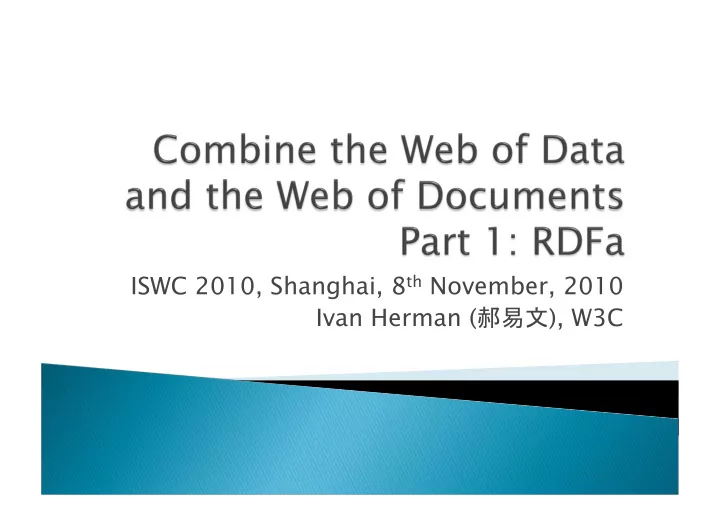

ISWC 2010, Shanghai, 8 th November, 2010 Ivan Herman ( 郝 易文 ), W3C
For RDF people, it sounds very simple: ◦ RDFa is a serialization of RDF embedded in XHTML, HTML, or XML in general (2)
(3)
(4)
Apart from relational databases, most of the data on the Web are in… (X)HTML content New content is generated every day How would one get structured data from that information? (5)
Do not generate RDF/XML files separately ◦ RDF/XML is complex ◦ it requires a separate storage, generation, etc mechanism that is also valid for, e.g., Turtle even when authoring with, say, Emacs, creating an extra file is a load (6)
Add extra structured content to the (X)HTML pages Let processors extract those and turn into RDF (7)
Microformats ◦ reuses HTML attributes like @class, @title ◦ separate vocabularies (address, CV, …) ◦ difficult to mix microformats (no concept of namespaces) ◦ possible to transform via, e.g., XSLT + GRDDL, but all transformations are vocabulary dependent (8)
Microdata ◦ adds new attributes to HTML5 to express metadata ◦ can use URI-s, it also fixes some vocabulary mappings (e.g., to Dublin Core elements) ◦ has no notion of datatypes, namespaces ◦ generic processing becomes possible to generate RDF (9)
RDFa ◦ adds new (X)HTML/XML attributes ◦ has namespaces and URIs at its core; i.e., mixing vocabulary is just as easy as in RDF ◦ complete flexibility for using Literals or URI Resources ◦ is a complete serialization of RDF ◦ generic processing becomes possible to generate RDF (10)
(11)
It is very important for RDF experts to ◦ know RDFa ◦ parse it alongside Turtle, RDF/XML or other ◦ when appropriate, generate RDFa pages (12)
(13)
RDFa means “ RDF in attributes ”. Ie: ◦ all RDF contents are defined through XML attributes (no elements) ◦ the XML/HTML tree structure is used ◦ many of the attributes are defined by RDFa some attributes (@href, @rel) are also reused ◦ if possible, the text content is also reused (for literals) as well as @href values (14)
The same (X)HTML file: ◦ is used, unchanged, by browsers they ignore attributes they do not know ◦ can be used by specialized processors (or APIs) to extract RDF triples (15)
The current Recommendation is RDFa 1.0 There is an RDFa1.1 in the making, almost ready I will talk about RDFa1.1 and warn when the feature is not available in RDFa1.0 (16)
XHTML HTML5 SVG ODF … 1.2 +RDFa +RDFa RDF Core 1.1 (valid for any XML) Formally: ◦ RDFa WG defines Core and XHTML ◦ HTML WG defines HTML5 this tutorial uses XHTML examples (17)
A browser usually asks for an HTML content: (18)
Via content negotiations this goes to: (19)
Via content negotiations this goes to: (20)
But a client could ask for, say, Turtle: (21)
The triples are embedded in the HTML file ◦ a client may know how to extract RDF triples directly from that file; or ◦ an online “distiller” service is used; or ◦ the server is set up to generate the Turtle file automatically (22)
(23)
RewriteEngine On RewriteBase /ns/entailment/data/ RewriteRule RDFS.ttl /2007/08/pyRdfa/extract?format=turtle& uri=http://www.w3.org/ns/entailment/data/RDFS.html [L] (24)
(25)
(26)
(27)
<p about="http://www.w3.org/ns/entailment/RDFS" property="http://purl.org/dc/terms/description"> Unique identifier for <em>RDFS Entailment</em>.</p> (28)
<p about="http://www.w3.org/ns/entailment/RDFS" property="http://purl.org/dc/terms/description"> Unique identifier for <em>RDFS Entailment</em>.</p> <http://www.w3.org/ns/entailment/RDFS> … . (29)
<p about="http://www.w3.org/ns/entailment/RDFS" property="http://purl.org/dc/terms/description"> Unique identifier for <em>RDFS Entailment</em>.</p> <http://www.w3.org/ns/entailment/RDFS> <http://purl.org/dc/terms/description> … . (30)
<p about="http://www.w3.org/ns/entailment/RDFS" property="http://purl.org/dc/terms/description"> Unique identifier for <em>RDFS Entailment</em>.</p> <http://www.w3.org/ns/entailment/RDFS> <http://purl.org/dc/terms/description> "Unique identifier for RDFS Entailment." . (31)
(32)
<a about="http://www.w3.org/ns/entailment/RDFS" rel="http://www.w3.org/2000/01/rdf-schema#seeAlso" href="http://www.w3.org/TR/2004/REC-rdf-mt-20040210/"> RDF Semantics. </a> (33)
<a about="http://www.w3.org/ns/entailment/RDFS" rel="http://www.w3.org/2000/01/rdf-schema#seeAlso" href="http://www.w3.org/TR/2004/REC-rdf-mt-20040210/"> RDF Semantics. </a> <http://www.w3.org/ns/entailment/RDFS> …. (34)
<a about="http://www.w3.org/ns/entailment/RDFS" rel="http://www.w3.org/2000/01/rdf-schema#seeAlso" href="http://www.w3.org/TR/2004/REC-rdf-mt-20040210/"> RDF Semantics. </a> <http://www.w3.org/ns/entailment/RDFS> <http://www.w3.org/2000/01/rdf-schema#seeAlso> … . (35)
<a about="http://www.w3.org/ns/entailment/RDFS" rel="http://www.w3.org/2000/01/rdf-schema#seeAlso" href="http://www.w3.org/TR/2004/REC-rdf-mt-20040210/"> RDF Semantics. </a> <http://www.w3.org/ns/entailment/RDFS> <http://www.w3.org/2000/01/rdf-schema#seeAlso> <http://www.w3.org/TR/2004/REC-rdf-mt-20040210/> . (36)
(37)
The combination of @about with @rel/ @property and possibly @href covers most of we need… But this is too complex for authors (38)
<http://www.w3.org/ns/entailment/RDFS> <http://purl.org/dc/terms/description> "Unique identifier for RDFS Entailment." . <http://www.w3.org/ns/entailment/RDFS> <http://www.w3.org/2000/01/rdf-schema#seeAlso> <http://www.w3.org/TR/2004/REC-rdf-mt-20040210/> . with @prefix rdfs: <http://www.w3.org/2000/01/rdf-schema#> . @prefix dc: <http://purl.org/dc/terms/> . <http://www.w3.org/ns/entailment/RDFS> rdfs:seeAlso <http://www.w3.org/TR/2004/REC-rdf-mt-20040210/> ; dc:description "Unique identifier for RDFS Entailment." . (39)
Use compact URI-s when possible Make use of XML structure for ◦ shared subjects ◦ shared predicates ◦ create blank nodes ◦ … (40)
Just like in Turtle: ◦ define a prefix via @prefix ◦ use prefix:reference to abbreviate a URI (41)
<html> … <p about="http://www.w3.org/ns/entailment/RDFS" property="http://purl.org/dc/terms/description"> Unique identifier for <em>RDFS Entailment</em>.</p> … </html> can be replaced by: <html prefix="dc: http://purl.org/dc/terms/"> … <p about="http://www.w3.org/ns/entailment/RDFS" property="dc:description"> Unique identifier for <em>RDFS Entailment</em>.</p> … </html> (42)
Can be anywhere in the XML tree and is valid for the whole sub-tree ◦ i.e., the html element is not the only place to have it The same @prefix attribute can hold several definitions: ◦ prefix="dc: http://purl.org… rdfs: http://…" (43)
An alternative (deprecated) syntax is ◦ xmlns:dc="http://purl.org/dc/terms/" CURIEs and “real” URIs can be mixed ◦ if an attribute value can be interpreted as a CURIE, fine ◦ alternatively, it is considered as a URI CURIEs can be used on RDFa attributes only! ◦ e.g., not for @href (44)
In RDFa 1.0 ◦ only the xslt:XXX syntax is usable ◦ CURIEs on @about can only be used with the syntax: about="[pref:ref]" ◦ Only CURIEs can be used on, e.g., @property or @rel (no fallback on URIs) (45)
The basic principle: @about is inherited by children nodes ◦ i.e., no reason to repeat it (46)
<html prefix="dc: http://purl.org/dc/terms/ rdfs: http://www.w3.org/2000/01/rdf-schema#"> … <body about="http://www.w3.org/ns/entailment/RDFS"> … <p property="dc:description"> Unique identifier for <em>RDFS Entailment</em>.</p> <p>…<a rel="rdfs:seeAlso" href="http://www.w3.org/TR/2004/REC-rdf-mt-20040210"> RDFS Semantics</a>…</p> (47)
@prefix rdfs: <http://www.w3.org/2000/01/rdf-schema#> . @prefix dc: <http://purl.org/dc/terms/> . <http://www.w3.org/ns/entailment/RDFS> rdfs:seeAlso <http://www.w3.org/TR/2004/REC-rdf-mt-20040210/> ; dc:description "Unique identifier for RDFS Entailment." . (48)
(49)
<body about=".." prefix="dc: http://…" <address> <p property="dc:date">2010-07-05</p> </address> </body> This leads to: @prefix dc: <http://…> <..> dc:date "2010-07-05" . (50)
Recommend
More recommend